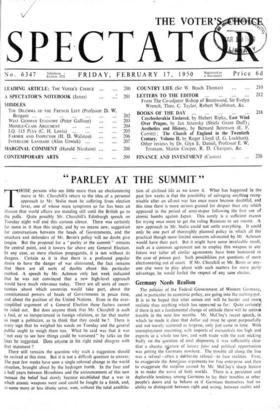Germany Needs Realism
The policies of the Federal Government of Western Germany, and in particular its economic policy, are going into the melting-pot. It is to be hoped that what comes .otit will be harder and mor% realistic than anything which has appeared so far. Quite certainly, if there is not a fundamental change of attitude there will be serious trouble in the next few months. Mr. McCloy's recent speech, in which he made it clear that dollar aid must be spent purposefully and not merely scattered as largesse, only just came in time. With unemployment mounting, with imports of inessentials too high and exports as a whole too low, and with trade with the east sticking badly on the question of steel shipments it was sufficiently clear that a chaotic rWxture of laissez faire and political opportunism was getting the Germans nowhere. The trouble all along the line was a refusal—often a deliberate refusal—to face realities. First, to exaggerate the American arguments for free enterprise and then to exaggerate the surprise caused by Mr. McCloy's sharp lecture is to make the worst of both worlds. There is a persistent and deplorable tendency among Germans to lay their troubles at other people's doors and to behave as if Germans themselves had no ability to distinguish between right and wrong, between reality and
unreality, between liberty and licence. If this tendency is not checked soon, the fruits of partial recovery will slip away, the rumours of a Communist putsch in West Berlin, with its 300,000 unemployed, will harden, and economic freedom will itself be discredited. For recovery is still only partial—there is an enormous task of reconstruction still to be completed, and until the back of that task is broken there must be discipline. It cannot now be imposed by the allies. It cannot be imposed by the Government alone, whether it is led by Dr. Adenauer or anyone else—though that Government has been doing its best by producing a series of sensible proposals for combating unemployment. It is fundamentally a matter for individual Germans. There is a fair chance that the Federal Government, which is now in the process of revising its economic policy, will give them a good lead. If that happens they must follow it promptly, forgetting the miserable struggle for party advantage which occupies so much time at Bonn and recognising that the alternative to realism is not free dollar aid any more. It is breakdown, hunger, and a direct struggle between Communists and neo-Nazis.



































